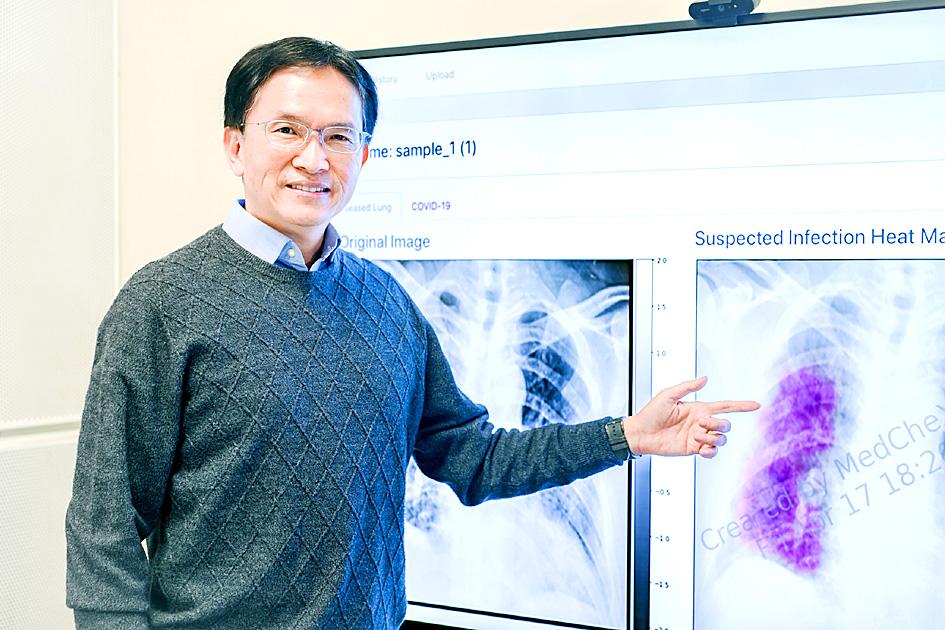A pneumonia detection system developed by National Cheng Kung University (NCKU) researchers that can be used for early diagnosis of COVID-19 has become widely used by medical professionals around the world, the university said on Thursday.
MedCheX, an e-alert system that is based on artificial intelligence (AI) for automatically detecting pneumonia from chest X-rays, was developed by a team featuring members of the university’s Department of Computer Science and Information Engineering that was headed by professor Chiang Jung-hsien (蔣榮先).
The system was created to automatically detect and alert doctors more quickly of high-risk patients with pneumonia and/or COVID-19, the university said.

Photo courtesy of NCKU via CNA
Ever since MedCheX was made available online, users from 61 countries have been using the system, which is available via a dedicated Web site, Chiang said.
The team had even been approached by several multinational firms to acquire the technology and commercialize MedCheX, he said.
However, the team decided to “donate” the system by allowing medical professionals around the world to access the service free of charge, Chiang said.
This system can be especially beneficial for countries that do not have enough medical resources or radiologists, the university said, adding that even in remote areas with a shortage of skilled doctors, the system can quickly detect and help prevent the spread of COVID-19.
MedCheX can be used by hospitals or clinics anywhere, as long as there is an Internet connection, to assist frontline doctors in diagnosing people who are infected, the school said.
The system was one of the winners of an online competition organized by the WHO in 2020 to seek solutions for tackling challenges related to the COVID-19 pandemic.
MedCheX was among the 89 projects selected out of 1,560 teams around the world in the WHO’s “Build for COVID-19 Global Online Hackathon” competition, the university said.
Last year, it was chosen by UNESCO’s International Research Center in Artificial Intelligence as one of the top 100 projects solving problems related to the UN Sustainable Development Goals with the application of AI.
The Tainan-based university said it was the only Asian institution to be chosen among the top 100 projects.

Nipah virus infection is to be officially listed as a category 5 notifiable infectious disease in Taiwan in March, while clinical treatment guidelines are being formulated, the Centers for Disease Control (CDC) said yesterday. With Nipah infections being reported in other countries and considering its relatively high fatality rate, the centers on Jan. 16 announced that it would be listed as a notifiable infectious disease to bolster the nation’s systematic early warning system and increase public awareness, the CDC said. Bangladesh reported four fatal cases last year in separate districts, with three linked to raw date palm sap consumption, CDC Epidemic Intelligence

The manufacture of the remaining 28 M1A2T Abrams tanks Taiwan purchased from the US has recently been completed, and they are expected to be delivered within the next one to two months, a source said yesterday. The Ministry of National Defense is arranging cargo ships to transport the tanks to Taiwan as soon as possible, said the source, who is familiar with the matter. The estimated arrival time ranges from late this month to early next month, the source said. The 28 Abrams tanks make up the third and final batch of a total of 108 tanks, valued at about NT$40.5 billion

Two Taiwanese prosecutors were questioned by Chinese security personnel at their hotel during a trip to China’s Henan Province this month, the Mainland Affairs Council (MAC) said yesterday. The officers had personal information on the prosecutors, including “when they were assigned to their posts, their work locations and job titles,” MAC Deputy Minister and spokesman Liang Wen-chieh (梁文傑) said. On top of asking about their agencies and positions, the officers also questioned the prosecutors about the Cross-Strait Joint Crime-Fighting and Judicial Mutual Assistance Agreement, a pact that serves as the framework for Taiwan-China cooperation on combating crime and providing judicial assistance, Liang

A group from the Taiwanese Designers in Australia association yesterday represented Taiwan at the Midsumma Pride March in Melbourne. The march, held in the St. Kilda suburb, is the city’s largest LGBTQIA+ parade and the flagship event of the annual Midsumma Festival. It attracted more than 45,000 spectators who supported the 400 groups and 10,000 marchers that participated this year, the association said. Taiwanese Designers said they organized a team to march for Taiwan this year, joining politicians, government agencies, professionals and community organizations in showing support for LGBTQIA+ people and diverse communities. As the first country in Asia to legalize same-sex